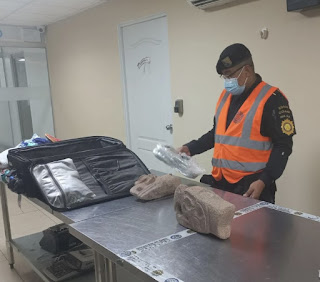The multilingual blabber here (and beyond) over the past few days has increasingly focused on the apparent undoing of US citizen and self-styled ‘social entrepreneur’ Stephanie Jolluck, a local floater in Antigua who has been rather barefacedly (but legally) profiting from cultural appropriation for some time, yet was pulled up last week at the international airport and accused of attempting to export several rather sizeable chunks of Guatemala's Mesoamerican patrimony.
My initial reaction was to ponder what kind of reasonably clued-up end educated person could ever get themselves into the situation depicted in this image…
Her local enablers and sympathisers were however soon gathering online to peddle the message that the incident was little more than the result of a unfortunate misunderstanding, the pieces having been purchased as reproductions in a provincial handicrafts market, "as you do..."
Indeed, if the items were anything less than fully authentic Ms Jolluck would ultimately have had little to worry about, beyond some bad publicity. And even if found to be genuine, she might have had a go at blaming the vendor. Nevertheless, the circumstances of her subsistence in Guatemala and the intent to remove the items from the country, both tended to fuel profound suspicions, which prosecutors must have acted on.
They initially released her on the understanding that she should consider that anything Mayan and rather old had secured a comprehensive restraining order against her. The suspicion has to be that they did so only in order to see what she would do next.
What she did next was invite her partner over and together they reportedly packed a vehicle with 165 other pieces (90% of which are said to be venerable, some over a millennium old), presumably plotting a more terrestrial getaway given the likelihood of further investigation by a dedicated part of Guatemala’s justice system.
Border checks for 'tourists' departing Guatemala via land or sea are almost non-existent, but the likes of Mexico and Belize for example, do tend to be a bit more curious with arrivals. But the couple must have anticipated what would happen if the MP dropped in for tea, and with fairly typical over-confidence and condescension, risked the interception which occurred on Sunday the 13th.
After two strikes in 48 hours all talk of unfortunate misunderstandings can surely now be discounted, along with more lenient outcomes.
Jolluck is just the most recently-undone member of that tribe of gentrified cultural bandits which has long been a scourge of Central America. Their outlook is superficially philanthropic — though usually with more than a dollop of smugness — yet their gainful activities are typically informed by an amorality born of entitlement.*
It's high time the folk at INGUAT got their heads around the perhaps counter-intuitive notion that part of their annual budget could usefully be kept aside for discouraging certain types of visit and in-county activity by foreigners.
When I first visited a major archaeological site in Belize in 1988, as a guest of the Belmopan Peace Corps mission, I was both flabbergasted and somewhat disgusted to learn that the American university in charge of the hard-to-reach dig (tied to a big name religious body) had a profitable sideline in tomb looting going on. And my discomfort was met with the same sort of faux indignation that we have regretably seen repeated here.
They had simply given themselves permission.
In this decade-old interview, Ms Jolluck gleefully explains the beauty of her paternalistic, parasitical engagement with "ethno chic". Along the lines of...
"My relationship with MY indians is less of a partnership and more of a hippie face-sucker kind of thing!¨
One thing in particular springs to mind after her downfall — Juan Gabriel Vásquez's Alfaguara prize-winning novel El Ruido de las Cosas al Caer, which explores the ways that the instincts behind initiatives like the Peace Corps lend themselves to corruption — specifically how both locals and gringos in late 70s Colombia switched rather painlessly into trafficking, predominantly with the self-serving justification of some sort of trickle down benefit to rural communities.
* A decade or so ago this would have been the most appropriate description of certain foreigners trafficking children for adoption abroad.






No comments:
Post a Comment